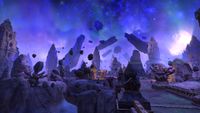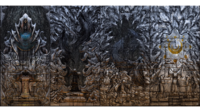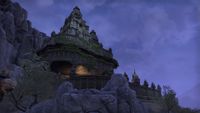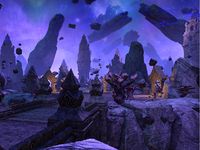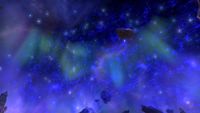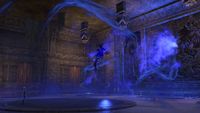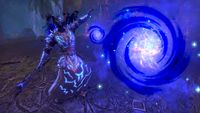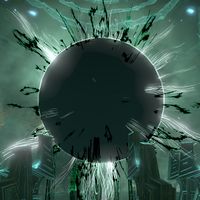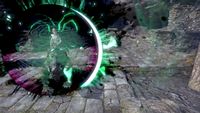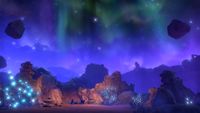Lore:Scuttling Void
| Scuttling Void | |
|---|---|
| Type | Plane |
| Realm | Oblivion |
| Appears in | ESO |
The Scuttling Void is a realm of Oblivion ruled over by the Daedric Prince Namira.[1] The Khajiit call it the Dark Behind the World (which is sometimes shortened to the Dark),[2] or Namiira's Void.[3] When a particularly large rift opens between the Dark Behind the World and Nirni, the breach is referred to as a Maw of Lorkhaj.[4][5] Very little is known of this shadowy Daedra's realm.[UOL 1]
Namiira serves as the antithesis to Khenarthi's role for Khajiiti spirits, instead corrupting them via the Bent Dance so that they may be dragged down into the Dark Behind the World. These corrupted spirits, known as the dro-m'Athra, occasionally slip through the cracks in Nirni, and tempt Khajiit so their souls can be sent to the Dark to serve Namiira.[6] Somewhere deep within the realm, there are grim forges and bent benches where these Lost Cats dance and arm themselves.[7]
Contents
History[edit]
Temple of the Seven Riddles[edit]
The Dark Behind the World has a history with the Temple of Seven Riddles in Reaper's March. The temple was purportedly built too tall—as the Clan Mothers say, "Khajiit aren't meant to stand so close to the Ja-Kha'jay before the dead-climb".[8] The dro-m'Athra have emerged at the Temple of Seven Riddles in part because of this factor,[8] but there is also a story told among the Doubting Monks who reside within the Temple.
Long ago, a Moon-Bishop referred to as the Stone-Tapper resided within the Temple of Seven Riddles. He carried a magic stick that told him secrets when he tapped it on the floor.[4] Day and night, the Bishop tapped the floor, learning all of Nirni's secrets. Eventually, the magic stick ran out of Nirni secrets, so it started telling him darker secrets: Namiira's secrets. The Tapper listened, growing old and crazy. The temple's monks went mad as well because the tapping never stopped. It was a loud and steady sound, like a heartbeat. Eventually, the monks plotted to kill the Stone-Tapper. They lured him to the High Lunarium and stabbed him. All the blood and secrets drained out of the Tapper's body and broke the Temple asunder, revealing a Maw of Lorkhaj.[4]
A rift to the Scuttling Void opened within Scrivener's Hall on 28th Sun's Dawn, 2E 570, and closed six years later on 30th Sun's Dusk, 2E 576.[1]
When the seals in the Temple of Seven Riddles were desecrated by an abbot named Kulan-dro in 2E 582, the boundary between Mundus and the Dark Behind the World was torn, and the dro-m'Athra invaded the temple,[2] before being banished once again by Chief-Crier Adara'hai of the Twilight Cantors and a group of adventurers who defeated the corrupted abbot and resealed the Maw, preventing the Dro-m'Athra from flooding into Nirn.[9][2]
The Rajaska and the Moon Beast[edit]
In 2E 582 Nirn would experienc an incursion of Rajaska, a type of powerful dro-m'Athra born when a Moon-Singer or Twilight Cantor falls to the Bent Dance. These Bent Cats, under the leadership of the first of their kind, the Rajaska-zhar Ravith-morna, turned more Twilight Cantors into Rajaska, hoping to enact a plan that'd threaten the entire Khajiit afterlife.[3][10][11][12] It is said that in some cases powerful unresolved emotions can cause the soul itself to crack and be wounded, allowing for a Void to be created within it. This Void-wound can prevent a spirit from moving into the afterlife beyond, even if they've been accepted, with the spirit holding itself back until its lingering affairs are resolved and the Void-wound is healed. In cases where a soul's strong unresolved emotions have caused a Void to form within it, that Void can be tapped into, serving as a source of great power. A soul's Void can even be used to create a rift across the planes, a shortcut allowing one to bypass planar boundaries to the afterlife. As emotions of love are said to create a real arcane connection between two souls, one who has such a bond with another soul can draw upon the loved one's soul for power should they know how, which includes tapping into the Void within that soul for their own use.[13][14][3] When either a soul is wounded by the Void or two souls wounded and darkened by it meet in a manner that mirrors the myth of Lorkhaj, revolving around a betrayal and a heart that is darkened by it, the recreation of the myth can give birth to a Moon Beast.[10] A beast of "pure darkness incarnate" formed within the Void itself, a reflection of the Void-Shade of Lorkhaj born of his Dark Heart. If formed, such a creature initially slumbers within the Void,[15][10] but can be called forth by the songs of the Rajaska.[11] The Rajaska attemptted to utilize these arcane phenomena to give rise to a new Moon Beast, and succeeded in doing so. Ravith-morna planned to use the Void-rift born of the soul of Zerith-var to have the Moon Beast reach Azurah's Crossing, where it is said it would have been capable of ending that afterlife itself, hunting and seizing any and all souls that attempt to cross over into the beyond and dragging them to the Void to be corrupted, thus ultimately making real a world of darkness, the dream of all Dro-m'Athra.[14][3][12][16]. The Vestige and Zerith-var, alongside the aid of Cantor Krin'ze inside whom the soul of an ancient Moon-Singer had reincarnated[14][3][13][17] entered the Dark Behind the World, redeemed the soul of Ravith-morna, and managed to stop the Moon-Beast before it reached the rift to the Crossing, banishing it back to the Void by invoking the power of the Hidden Moon.[3][18]
Access Closed Off by the Elder Council[edit]
Circa 3E 432, access to the Scuttling Void had been closed off by consensus of the Elder Council.[UOL 1]
Gallery[edit]
A Welwa rewarded by Namira summoned from her realm
References[edit]
- ^ a b Mazandi's Rift Tracking — Mazandi
- ^ a b c Adara'hai's dialogue in ESO
- ^ a b c d e f Zerith-var's dialogue in ESO
- ^ a b c Vazshara's Journal — Vazshara
- ^ Maw of Lorkhaj loading screen in ESO
- ^ Litter-Mates of Darkness — Moon-Bishop Hunal
- ^ Crafting Motif 35: Dro-m'Athra Style — Twilight Cantor Adara'hai
- ^ a b Adara'hai's dialogue during the quest Into the Maw in ESO
- ^ Into the Maw quest in ESO
- ^ a b c Viti's Notes: Moon Beasts — High Cantor Viti
- ^ a b Eifa's dialogue in ESO
- ^ a b Ravith-morna's dialogue in ESO
- ^ a b Viti's Notes: Order of the Hidden Moon, Part I — High Cantor Viti
- ^ a b c Cantor Krin'ze's dialogue in ESO
- ^ Cantor Izalgo's Journal — Cantor Izalgo
- ^ Paths Out Of Darkness quest description in ESO
- ^ Krin'ze's Journal — Cantor Krin'ze
- ^ Events ofThe Dark Behind the World in ESO
Note: The following references are considered to be unofficial sources. They are included to round off this article and may not be authoritative or conclusive.
